Board of Councilors
Rodney Newberry, MD - President
 Dr. Newberry is a Professor of Medicine at Washington University School of Medicine in Saint Louis Missouri where he directs a research laboratory studying the biology of the intestinal immune system and sees patients at Barnes Jewish Hospital as a gastroenterologist. His research focuses on how the intestinal immune system maintains tolerance to dietary antigens and gut commensal organisms despite encountering them in the setting of inflammatory stimuli. Recently this work has included a previously unappreciated role for specialized intestinal epithelial cells, goblet cells, in delivering luminal substances to the gut immune system to induce and shape subsequent immune responses. His work has been continually funded by grants from the National Institutes of Health and published in high profile journals including Nature, Nature Medicine, Nature Immunology, Science Immunology, and Mucosal Immunology. Dr. Newberry has mentored numerous trainees including fellows, postdocs, and students. Dr. Newberry’s current service to the community includes North American Councilor for the Society for Mucosal Immunology, a standing member of the National Institutes of Health Gastrointestinal Mucosal Pathobiology study section, chair of the Grants Council and member of the National Scientific Advisory Committee of the Crohn’s and Colitis Foundation of America, and associate editor for The Journal of Immunology.
Dr. Newberry is a Professor of Medicine at Washington University School of Medicine in Saint Louis Missouri where he directs a research laboratory studying the biology of the intestinal immune system and sees patients at Barnes Jewish Hospital as a gastroenterologist. His research focuses on how the intestinal immune system maintains tolerance to dietary antigens and gut commensal organisms despite encountering them in the setting of inflammatory stimuli. Recently this work has included a previously unappreciated role for specialized intestinal epithelial cells, goblet cells, in delivering luminal substances to the gut immune system to induce and shape subsequent immune responses. His work has been continually funded by grants from the National Institutes of Health and published in high profile journals including Nature, Nature Medicine, Nature Immunology, Science Immunology, and Mucosal Immunology. Dr. Newberry has mentored numerous trainees including fellows, postdocs, and students. Dr. Newberry’s current service to the community includes North American Councilor for the Society for Mucosal Immunology, a standing member of the National Institutes of Health Gastrointestinal Mucosal Pathobiology study section, chair of the Grants Council and member of the National Scientific Advisory Committee of the Crohn’s and Colitis Foundation of America, and associate editor for The Journal of Immunology.
In addition to the Society for Mucosal Immunology, Dr. Newberry is a member of the American Gastroenterological Association, the American Association of Immunologists, and the Crohn’s and Colitis Foundation.
Clare Lloyd, PhD - President-Elect
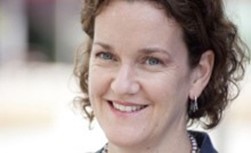 Dr. Lloyd completed BSc and PhD degrees in Immunology at Kings College London, and Postdoctoral fellowships at Guys Hospital London and Harvard Medical School, Boston. She moved to Millennium Pharmaceuticals in Cambridge USA as a scientist in the Inflammation Division, where she was involved in the cloning and in vivo characterisation of novel genes involved in Th2 responses. She then moved back to the UK to start a Wellcome Senior Fellowship in Basic Biomedical Sciences in the National Heart and Lung Institute at Imperial College. Dr. Lloyd renewed her Senior Fellowship in 2004, 2009 and 2015. She was awarded a Professorial Chair in Respiratory Immunology in 2006 and took over as Head of Section in 2010, and as Head of Division of Respiratory Sciences in 2015.
Dr. Lloyd completed BSc and PhD degrees in Immunology at Kings College London, and Postdoctoral fellowships at Guys Hospital London and Harvard Medical School, Boston. She moved to Millennium Pharmaceuticals in Cambridge USA as a scientist in the Inflammation Division, where she was involved in the cloning and in vivo characterisation of novel genes involved in Th2 responses. She then moved back to the UK to start a Wellcome Senior Fellowship in Basic Biomedical Sciences in the National Heart and Lung Institute at Imperial College. Dr. Lloyd renewed her Senior Fellowship in 2004, 2009 and 2015. She was awarded a Professorial Chair in Respiratory Immunology in 2006 and took over as Head of Section in 2010, and as Head of Division of Respiratory Sciences in 2015.
Dr. Lloyd’s research interests encompass multiple aspects of mucosal immunology, focussing primarily upon epithelial-immune interactions underlying development and resolution of allergic airway inflammation. She has developed innovative methods of modelling allergen driven inflammation and tissue remodelling in vivo in order to analyse the complex relationships between inflammatory cells and resident stromal cells. She has also developed tools in order to dissect molecular pathways underlying different clinical disease phenotypes, and fostered collaborations with clinical scientists to enable findings in mouse models to be extended to clinical investigations of bronchial biopsy specimens from allergic subjects following allergen challenge. She has a particular interest in early life immunity, using innovative neonatal mouse models and cells from patients with paediatric severe asthma – identifying molecules associated with steroid resistance and early life immune development. These findings impact on lifelong lung health, and have led to a major strategic award to investigate molecular mechanisms underlying wheeze in babies and young children
She is a passionate advocate of support for early career researchers, and has served as an advisor to the Vice Provost (Research) to develop Imperial’s support for this group. Dr. Lloyd was the NHLI Lead for Women (2009-2015) involving promoting and developing careers for women.
Dr. Lloyd has presented at major National and International meetings in the respiratory and immunology fields. She organised the 2014 TransAtlantic airway conference, gave the 2014 Manor House Lecture (in Germany) and organised a Keystone Symposium on Asthma in 2017. She also has served on the international planning committee for previous ICMI meetings (Vancouver 2013), MICS (Toronto 2016) and will co-organise the 2018 EMIG. Finally, she has held key editorial roles including Deputy Editor of Thorax, and is currently an associate editor of Mucosal Immunology, an advisory editor for Journal of Experimental Medicine and is on the scientific advisory board of Science Immunology.
William Agace, PhD - Immediate Past President
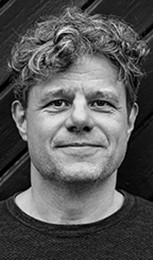 Dr. Agace received a B.Sc. (Hons) in Microbiology from Bristol University, UK, in 1989. He then moved to Lund, Sweden (following a Swede-now wife) and obtained a PhD. from Lund University in 1996 in the area of Mucosal Immunology. Dr. Agace’s PhD studies were in the area of urinary tract infections, under the guidance of Dr C. Svanborg, focusing on epithelial cytokine responses to uropathogenic E.coli in murine models and uroepithelial cell lines. During this time Dr. Agace developed an interest in epithelial-immune cell interactions and after completing his PhD decided to move up in the world (anatomically) and joined the laboratory of Dr. C. Parker (Department of Rheumatology, Immunology and Allergy, at the Brigham and Women’s Hospital) to study intestinal intraepithelial lymphocyte (IEL)/epithelial crosstalk. Taking his early interest in chemokines from his time as a PhD student he set about assessing the role of chemokine/chemokine receptors in regulating T cell recruitment to the intestinal mucosa. Such collaborative studies led to the identification of CCR9/CCL25 as a potential mediator of T cell homing to the small intestine. In 1999, Dr. Agace returned to Lund with a project grant from the Crohn’s and Colitis foundation of America (CCFA) that played in instrumental role in his ability to set up his independent group at the Immunology Section at Lund University. Since this time his groups major contribution to the field of mucosal immunology include identification of CCR9 as T cell homing receptor for the small intestine in mice, identification of intestinal CD103+ dendritic cells (DCs) in mouse and humans and demonstration that small intestinal derived DCs are potent in generating ‘small intestinal tropic’ T cells through enhanced production of retinoic acid, demonstration that intestinal CD103+ DCs and not macrophages constitutively migrate to draining mesenteric lymph nodes and play a key role in presenting luminal derived antigen to T cells at this site, and more recently that the intestine contains multiple DC subsets that play key non-redundant roles in intestinal T cell homeostasis in vivo. Major current interests include assessing the role of environment in regulating immune/stromal cell functionality and specialization within the mucosa. His group’s research has resulted in several Nordic awards including the Anders Jahre Young Researcher Award in Biomedicine from the University of Oslo and the Göran Gustafsson Prize in Medicine from the Swedish Royal Academy of Sciences. Dr. Agace headed the Immunology section in Lund from 2006-2014 and currently divides his time running research groups at Lund University, Sweden and the Technical University of Denmark. Dr. Agace has served as an associate editor of the Scandinavian Journal of Immunology (2007-2015), European Journal of immunology (2007-2015) and since 2012 acts as deputy editor of Mucosal Immunology. He has served on the international planning committee of ICMI meetings (Vancouver 2013, Berlin 205, MIICS Toronto 2016) and is the main organizer of the 10th EMIG conference, Copenhagen 2016.
Dr. Agace received a B.Sc. (Hons) in Microbiology from Bristol University, UK, in 1989. He then moved to Lund, Sweden (following a Swede-now wife) and obtained a PhD. from Lund University in 1996 in the area of Mucosal Immunology. Dr. Agace’s PhD studies were in the area of urinary tract infections, under the guidance of Dr C. Svanborg, focusing on epithelial cytokine responses to uropathogenic E.coli in murine models and uroepithelial cell lines. During this time Dr. Agace developed an interest in epithelial-immune cell interactions and after completing his PhD decided to move up in the world (anatomically) and joined the laboratory of Dr. C. Parker (Department of Rheumatology, Immunology and Allergy, at the Brigham and Women’s Hospital) to study intestinal intraepithelial lymphocyte (IEL)/epithelial crosstalk. Taking his early interest in chemokines from his time as a PhD student he set about assessing the role of chemokine/chemokine receptors in regulating T cell recruitment to the intestinal mucosa. Such collaborative studies led to the identification of CCR9/CCL25 as a potential mediator of T cell homing to the small intestine. In 1999, Dr. Agace returned to Lund with a project grant from the Crohn’s and Colitis foundation of America (CCFA) that played in instrumental role in his ability to set up his independent group at the Immunology Section at Lund University. Since this time his groups major contribution to the field of mucosal immunology include identification of CCR9 as T cell homing receptor for the small intestine in mice, identification of intestinal CD103+ dendritic cells (DCs) in mouse and humans and demonstration that small intestinal derived DCs are potent in generating ‘small intestinal tropic’ T cells through enhanced production of retinoic acid, demonstration that intestinal CD103+ DCs and not macrophages constitutively migrate to draining mesenteric lymph nodes and play a key role in presenting luminal derived antigen to T cells at this site, and more recently that the intestine contains multiple DC subsets that play key non-redundant roles in intestinal T cell homeostasis in vivo. Major current interests include assessing the role of environment in regulating immune/stromal cell functionality and specialization within the mucosa. His group’s research has resulted in several Nordic awards including the Anders Jahre Young Researcher Award in Biomedicine from the University of Oslo and the Göran Gustafsson Prize in Medicine from the Swedish Royal Academy of Sciences. Dr. Agace headed the Immunology section in Lund from 2006-2014 and currently divides his time running research groups at Lund University, Sweden and the Technical University of Denmark. Dr. Agace has served as an associate editor of the Scandinavian Journal of Immunology (2007-2015), European Journal of immunology (2007-2015) and since 2012 acts as deputy editor of Mucosal Immunology. He has served on the international planning committee of ICMI meetings (Vancouver 2013, Berlin 205, MIICS Toronto 2016) and is the main organizer of the 10th EMIG conference, Copenhagen 2016.
Lauren Zenewicz, PhD - Treasurer
Dr. Lauren A. Zenewicz is an Assistant Professor of Microbiology and Immunology at the University of Oklahoma Health Sciences Center in Oklahoma City. She completed her doctoral training in bacterial pathogenesis at the University of Pennsylvania where, under Hao Shen, PhD, she examined how similar virulence factors of the mucosal pathogens Listeria monocytogenes and Bacillus anthracis modulated innate and adaptive immune responses. As a post-doctoral fellow with Richard A. Flavell, Ph.D., F.R.S., in the Department of Immunobiology at Yale University, she began her studies on interleukin-22 (IL-22), an important cytokine in modulating tissue responses during inflammation. Her research revealed both a protective and pathologic role for IL-22 in the inflamed gastrointestinal tract. Her studies also showed that IL-22 has effects on the host microbiota, causing changes in flora composition that can lead to exacerbated colitis. Through her research, Dr. Zenewicz identified that both T cells and innate lymphocytes are an important source of IL-22. Her laboratory is now focused on investigating the role of environmental factors in the regulation of IL-22 expression in T cells and innate lymphocytes.
at the University of Pennsylvania where, under Hao Shen, PhD, she examined how similar virulence factors of the mucosal pathogens Listeria monocytogenes and Bacillus anthracis modulated innate and adaptive immune responses. As a post-doctoral fellow with Richard A. Flavell, Ph.D., F.R.S., in the Department of Immunobiology at Yale University, she began her studies on interleukin-22 (IL-22), an important cytokine in modulating tissue responses during inflammation. Her research revealed both a protective and pathologic role for IL-22 in the inflamed gastrointestinal tract. Her studies also showed that IL-22 has effects on the host microbiota, causing changes in flora composition that can lead to exacerbated colitis. Through her research, Dr. Zenewicz identified that both T cells and innate lymphocytes are an important source of IL-22. Her laboratory is now focused on investigating the role of environmental factors in the regulation of IL-22 expression in T cells and innate lymphocytes.
Theresa Alenghat, DVM, PhD - Councilor-Americas
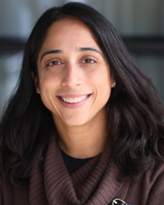 Dr. Theresa Alenghat is an Associate Professor in the Immunobiology Division of Cincinnati Children’s Hospital Medical Center at the University of Cincinnati. Dr. Alenghat has established a research program that explores mechanisms underlying the host-microbiota relationship, and how this regulation affects mucosal immunity and inflammatory conditions. Dr. Alenghat has pioneered studies revealing that epigenetics and histone deacetylase 3 permit intestinal epithelial cells to sense commensal bacteria and convey this information to the mammalian host. Her lab's work includes investigation into pathways that enable diet and microbiota-derived metabolites to direct epithelial and immune cell homeostasis in mucosal tissues.
Dr. Theresa Alenghat is an Associate Professor in the Immunobiology Division of Cincinnati Children’s Hospital Medical Center at the University of Cincinnati. Dr. Alenghat has established a research program that explores mechanisms underlying the host-microbiota relationship, and how this regulation affects mucosal immunity and inflammatory conditions. Dr. Alenghat has pioneered studies revealing that epigenetics and histone deacetylase 3 permit intestinal epithelial cells to sense commensal bacteria and convey this information to the mammalian host. Her lab's work includes investigation into pathways that enable diet and microbiota-derived metabolites to direct epithelial and immune cell homeostasis in mucosal tissues.
Taylor Cohen, PhD - Industry-Affiliated Councilor
Taylor Cohen began his career in the lab of Dr. Susan Margulies, University of Pennsylvania, studying epithelial barrier function in the lung. During his PhD, his work described how epithelial MAPk signaling pathways were activated in response to infection (sepsis) and mechanical stress (ventilation), and how activation of these pathways contributed to epithelial barrier dysfunction and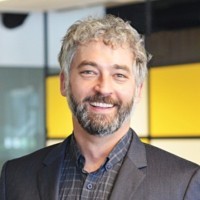 VAP. Following his PhD, Dr. Cohen moved to New York to work with Dr. Alice Prince at Columbia University. Here, his focus shifted away from the epithelium towards innate immune activities in the lung’s mucosal surface. Specifically, he focus on the role of the NLRC4 inflammasome and type III interferon signaling in response to opportunistic bacterial pathogens. His work showed that activation of these pathways created an imbalance in the immune tone of the lung, enabling or promoting infection with either Pseudomonas aeruginosa (NLRC4 and type III IFN) or Staphylococcus aureus (type III IFN). He joined the infectious disease department at MedImmune in 2014, where he focused on developing pathogen specific antibodies against these bacteria. In 2018 Dr. Cohen’s focus shifted to a broader understanding of host – microbial interaction. He built a group and lead a team aimed at understanding and identifying targets at the microbiome/host interface for the treatment of disease. In 2022, Dr. Cohen took on the role of Global Project Lead leading a cross functional team working on discovery and development of antibodies against SARS-CoV-2. He is currently leads the COVID-19 Long Acting Antibody programs at AstraZeneca.
VAP. Following his PhD, Dr. Cohen moved to New York to work with Dr. Alice Prince at Columbia University. Here, his focus shifted away from the epithelium towards innate immune activities in the lung’s mucosal surface. Specifically, he focus on the role of the NLRC4 inflammasome and type III interferon signaling in response to opportunistic bacterial pathogens. His work showed that activation of these pathways created an imbalance in the immune tone of the lung, enabling or promoting infection with either Pseudomonas aeruginosa (NLRC4 and type III IFN) or Staphylococcus aureus (type III IFN). He joined the infectious disease department at MedImmune in 2014, where he focused on developing pathogen specific antibodies against these bacteria. In 2018 Dr. Cohen’s focus shifted to a broader understanding of host – microbial interaction. He built a group and lead a team aimed at understanding and identifying targets at the microbiome/host interface for the treatment of disease. In 2022, Dr. Cohen took on the role of Global Project Lead leading a cross functional team working on discovery and development of antibodies against SARS-CoV-2. He is currently leads the COVID-19 Long Acting Antibody programs at AstraZeneca.
Laura Cook, PhD - Councilor-Australia/Asia
Dr. Laura Cook is an NHMRC Emerging Leader Fellow in the Department of Microbiology & Immunology, University of Melbourne, based at the Doherty Institute. Laura completed a PhD in Immunology at the Kirby Institute, University of New South Wales, Sydney, Australia in 2014, where she analyzed antigen-specific human regulatory T cells in chronic viral infections and celiac disease. She then completed a postdoctoral research fellowship at the University of British Columbia studying human CD4+ T cell memory responses to bacterial antigens in IBD and C. difficile infection and developed protocols to expand various subsets of regulatory T cells for therapeutic applications. Her current research focuses on understanding the functions of human regulatory T cells within responses to pathogens and their contributions to immune impairment following severe infection. Her team is developing human gut organoid and T cell co-culture models to answer these questions. Laura is currently a committee member of the Mucosal Immunology Special Interest Group of the Australian and New Zealand Society for Immunology.
Institute. Laura completed a PhD in Immunology at the Kirby Institute, University of New South Wales, Sydney, Australia in 2014, where she analyzed antigen-specific human regulatory T cells in chronic viral infections and celiac disease. She then completed a postdoctoral research fellowship at the University of British Columbia studying human CD4+ T cell memory responses to bacterial antigens in IBD and C. difficile infection and developed protocols to expand various subsets of regulatory T cells for therapeutic applications. Her current research focuses on understanding the functions of human regulatory T cells within responses to pathogens and their contributions to immune impairment following severe infection. Her team is developing human gut organoid and T cell co-culture models to answer these questions. Laura is currently a committee member of the Mucosal Immunology Special Interest Group of the Australian and New Zealand Society for Immunology.
Timothy Hand, PhD - Councilor-Americas
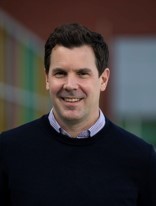 I am an Associate Professor of Pediatrics and Immunology and the Director of the Gnotobiotic Animal core facility at the University of Pittsburgh. My laboratory is within the UPMC Children’s Hospital of Pittsburgh. I grew up in Toronto, and received a B.Sc. (Hon.) from the University of Toronto. I next moved to Yale University where I received a PhD for studies on the requirements for the long-term survival of memory T cells. I followed my PhD studies with a postdoctoral fellowship at the National Institutes of Health with Yasmine Belkaid, where I shifted my interests to research on the interaction between intestinal resident lymphocytes and the microbiota.
I am an Associate Professor of Pediatrics and Immunology and the Director of the Gnotobiotic Animal core facility at the University of Pittsburgh. My laboratory is within the UPMC Children’s Hospital of Pittsburgh. I grew up in Toronto, and received a B.Sc. (Hon.) from the University of Toronto. I next moved to Yale University where I received a PhD for studies on the requirements for the long-term survival of memory T cells. I followed my PhD studies with a postdoctoral fellowship at the National Institutes of Health with Yasmine Belkaid, where I shifted my interests to research on the interaction between intestinal resident lymphocytes and the microbiota.
Currently, I direct the Immunity to Bacterial Colonization Lab. My research focuses upon the interaction between the host immune system and the intestinal microbiota, with a particular focus on the moments when microorganisms first colonize the host. My research has provided new knowledge on how immune cells are shaped by the microbiome and in turn how colonizing bacteria are shaped by intestinal immunity. Regulating microbial colonization is especially critical in infants where our lab studies how antibodies provided in breast milk shape the development of the infant microbiota and intestinal immune response. Other lab focuses include studies of how the microbiota affects health issues relevant to children, such as vaccination, cancer and Inflammatory Bowel Disease. I have received nationally competitive awards, including awards from the Burroughs Wellcome Foundation, the Rainin Foundation and the March of Dimes and is the recipient of several NIH grants. I have published over 35 research articles and scholarly
reviews and was named the inaugural ‘Emerging Leader’ by the Society for Mucosal Immunology in 2022.
Iliyan Iliev, PhD - Councilor-Americas
 Principle Investigator and Assistant Professor at the Department of Medicine at Weill Cornell Medicine in New York where (in affiliation with the Jill Roberts Institute for Research in IBD) he leads a research effort focused on understanding the functional consequences of fungal microbiota (mycobiota) composition and metabolism to host mucosal immunity and several inflammatory diseases.
Principle Investigator and Assistant Professor at the Department of Medicine at Weill Cornell Medicine in New York where (in affiliation with the Jill Roberts Institute for Research in IBD) he leads a research effort focused on understanding the functional consequences of fungal microbiota (mycobiota) composition and metabolism to host mucosal immunity and several inflammatory diseases.Ivaylo Ivanov, PhD - Councilor-Americas
Dr. Ivanov is a tenured Associate Professor at the Department of Microbiology and Immunology at the Vagelos College of Physicians and Surgeons at Columbia University where he heads the Laboratory for Mucosal Immunology. Dr. Ivanov obtained his BSc and MSc in Molecular Biology from Sofia University in Sofia, Bulgaria, and his PhD in Cell and Molecular Biology from the University of Alabama at Birmingham. He performed postdoctoral training at New York University School of Medicine.
in Sofia, Bulgaria, and his PhD in Cell and Molecular Biology from the University of Alabama at Birmingham. He performed postdoctoral training at New York University School of Medicine.
Dr. Ivanov’s research focuses on mucosal immunology and the role of microbiota in gut and systemic host immunity and physiology. His work identified the first commensal bacterial species that controls the function of mucosal T cells. Seminal studies from his laboratory have played major role in deciphering the mechanisms by which microbiota interact with intestinal epithelial cells and control mucosal T cell differentiation and function. More recently, his group uncovered a network of interactions between diet, microbiota, and mucosal immunity that regulates systemic diseases, such as obesity.
Dr. Ivanov is a recipient of multiple recognitions such as NIH Pathway to Independence Award, Crohn’s and Colitis Foundation Young Investigator Award, Crohn’s and Colitis Foundation Senior Research Award, and the inaugural Pew Charitable Trusts Innovator Award to name a few. Dr. Ivanov is a Pew Scholar in Biomedical Sciences supported by the Pew Charitable Trust and an Investigator in the Pathogenesis of Infectious Disease supported by the Burroughs Wellcome Fund.
Irah King, PhD - Young Professional Councilor
Irah King, PhD, is an Associate Professor in the Department of Microbiology and Immunology at McGill University in Montreal, Quebec. Irah holds a Canada Research Chair in Barrier Immunity from the Canadian Institutes of Health Research and his laboratory is located within the Meakins-Christie Laboratories at the McGill University Health Centre – Research Institute (MUHC-RI).
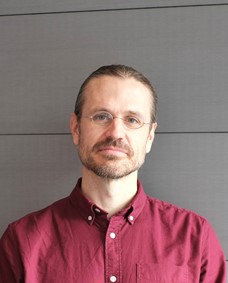
Irah grew up in rural Pennsylvania and first discovered an interest in fundamental research while completing a Master’s degree in Physical Therapy at the University of Pittsburgh. At that point, he then pursued a PhD at the University of Rochester studying dendritic cell differentiation and function in the context of neuroimmunological disease under the mentorship of Dr. Benjamin Segal. Following his doctoral studies, Irah broadened his immunology training by completing a postdoctoral fellowship with Dr. Markus Mohrs at the Trudeau Institute investigating mechanisms of protective immunity against intestinal helminth infection.
Beginning in 2012, Irah started his research program at McGill University pursuing questions related to innate and adaptive mechanisms of immunity and inflammation at barrier surfaces including the gut, lung and skin. For his initial studies, he was awarded the 2016 Canadian Society for Immunology New Investigator Award. A major interest of Irah’s team continues to be unravelling mechanisms of host defense against intestinal helminths, with a particular interest in immune-epithelial-parasite interactions. In addition, he has recently expanded his program to discover how the gut microbiota has local and systemic effects on the immune system in the setting of bacterial and parasitic infections. To promote microbiome research at his institution, he established the McGill Centre for Microbiome Research in 2020 and is the Director of the Gnotobiotic Animal Research Platform at the MUHC-RI. To support his program, Irah has received funds from federal and international funding agencies including the Canadian Institutes of Health Research, the National Institutes of Health and the Kenneth Rainin Foundation. He currently serves as the Chair of the Scientific Advisory Committee for the McGill Interdisciplinary Initiative in Infection and Immunity, a Faculty-wide effort to raise funds dedicated to translational research for the prevention, cure and elimination of major infectious and immune threats. Irah has been an SMI member since 2012 and was recently elected as an SMI Board Member in 2022.
Twitter: @King_Lab_McGill
Website: https://meakinsmcgill.com/king/
Kathryn Knoop, PhD - Young Professional Councilor
Kathryn Knoop has recently been appointed a Young Professor Councilor for the SMI Board.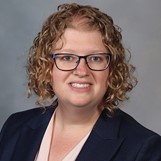 Additionally, she is the new head of the Communications Committee for SMI. Having served as the social media editor of the journal Mucosal Immunology since 2017, Kathryn is passionate about providing a strong virtual community for SMI members to increase global connectivity.
Additionally, she is the new head of the Communications Committee for SMI. Having served as the social media editor of the journal Mucosal Immunology since 2017, Kathryn is passionate about providing a strong virtual community for SMI members to increase global connectivity.
Bart N Lambrecht, MD, PhD - Councilor-Europe/Africa
Bart N. Lambrecht obtained an MD (1993) and PhD (1999) in Medicine at Ugent and specialized in Pulmonary Medicine (2002) at Erasmus University Medical Center in Rotterdam, The Netherlands. He is Professor of Pulmonary Medicine at ErasmusMC and at UGent, Belgium, and since 2012 the director of the VIB Inflammation Research Center, hosting 400 scientists. He is a multiple ERC grant awardee and serves on the editorial board of Trends in Immunology and Journal of Experimental Medicine. He has (co)authored over 400 papers in the field of asthma and allergy and respiratory viral infection.
Medical Center in Rotterdam, The Netherlands. He is Professor of Pulmonary Medicine at ErasmusMC and at UGent, Belgium, and since 2012 the director of the VIB Inflammation Research Center, hosting 400 scientists. He is a multiple ERC grant awardee and serves on the editorial board of Trends in Immunology and Journal of Experimental Medicine. He has (co)authored over 400 papers in the field of asthma and allergy and respiratory viral infection.
Together with Prof. Hamida Hammad he leads a research unit of 36 people. The research in their unit is centered around the role of antigen-presenting in asthma and respiratory viral infection. They study how DCs and macrophages get activated to bridge innate and adaptive immunity in the lung and cause inflammation in response to allergen inhalation or exacerbations by respiratory virus. They focus on the traditional immunological functions of APCs, but the research team is also known for their approach on how epithelial cells and innate immune cells communicate with APCs to cause or perpetuate disease. Their research strategy is to continuously develop new tools and therapeutic targets, so that they can tackle questions in an innovative and competitive manner. Their ultimate goal is to find novel ways to prevent and treat asthma, and to achieve this goal they set up early stage collaborations with Biotech and Pharma, to take their ideas to the clinic. Since the COVID-19 crisis, he has initiated two large multi-center trials on new immunomodulators in COVID-19, the SARPAC trial testing the effect of inhaled GM-CSF; and the COV-AID trial addressing the impact of early interleukin-1 and -6 blockade in COVID-19.
A full list of publications can be found at https://biblio.ugent.be/person/801000968239
Jennifer Lund, PhD - Councilor-Americas
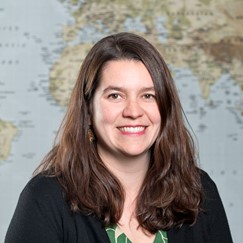
Jennifer M. Lund, PhD, is a Professor in the Vaccine and Infectious Disease Division at the Fred Hutchinson Cancer Center and a Professor in the Department of Global Health at the University of Washington in Seattle, Washington. She completed her doctoral degree at Yale University (2001-2006), where she worked in the laboratory of Akiko Iwasaki, and then did postdoctoral training in the laboratory of Sasha Rudensky at the University of Washington (2006-2008). Dr. Lund's research program focuses on understanding the basic mechanisms of antiviral immunity, using both mouse models and human cells and tissue samples to study the local and mucosal immune responses to genital HSV-2, West Nile virus, Zika virus, and HIV-1.
Mark Travis, PhD - Councilor-Europe/Africa
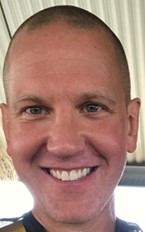
Mark completed a PhD in Protein Biochemistry at the University of Manchester in 2004, before moving to UCSF as a post-doc with Dean Sheppard. It was during this time that Mark first became interested in mucosal immunology, and he returned to Manchester as a research fellow to start his own lab in 2007. Mark became a lecturer in 2012, senior lecturer in 2015 and professor in 2018, and was appointed Head of Division for the Division of Immunology, Immunity to Infection, and Respiratory Medicine in June 2020. Mark's lab studies how immune responses are regulated in the gut and the lung and has focused on pathways that control the cytokine TGFβ. Work has identified how different immune cells activate TGFβ, the functional consequences of these pathways, and how they are altered in human diseases such as inflammatory bowel disease.
Antiopi Varelias, PhD - Councilor-Australia/Asia
Associate Professor Antiopi Varelias leads the Transplantation Immunology laboratory at the QIMR Berghofer Medical Research Institute, Brisbane, Australia. She was awarded her PhD from the University of Adelaide and after successive postdoctoral positions moved to QIMR Berghofer in 2008. She is a mid-career research academic with extensive expertise in basic and translational researc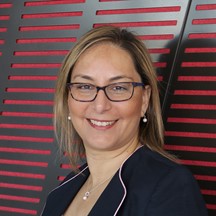 h in the field of hematopoietic stem cell transplantation (HSCT). Preclinical murine models are central to her research thus her research program is focused on understanding fundamental immunological mechanisms that underlie major complications that occur after HSCT, in particular graft-versus-host disease (GVHD) and opportunistic infections, both of which involve mucosal tissues. Current research investigates the interplay between cytokines and intestinal microbiota, and the impact of these interactions on acute GVHD in the gastrointestinal tract. Additionally, her research investigates immunological mechanisms that drive increased mortality after HSCT following respiratory viral infection. Her research program is highly collaborative both nationally and internationally, with the overarching goal to translate basic research findings into clinical practice and improve transplant outcomes for patients.
h in the field of hematopoietic stem cell transplantation (HSCT). Preclinical murine models are central to her research thus her research program is focused on understanding fundamental immunological mechanisms that underlie major complications that occur after HSCT, in particular graft-versus-host disease (GVHD) and opportunistic infections, both of which involve mucosal tissues. Current research investigates the interplay between cytokines and intestinal microbiota, and the impact of these interactions on acute GVHD in the gastrointestinal tract. Additionally, her research investigates immunological mechanisms that drive increased mortality after HSCT following respiratory viral infection. Her research program is highly collaborative both nationally and internationally, with the overarching goal to translate basic research findings into clinical practice and improve transplant outcomes for patients.
Benjamin Marsland, PhD - Ex-Officio, Journal Editor
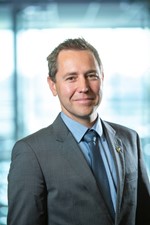 Ben Marsland completed his PhD in Immunology at Otago University and the Malaghan Institute of Medical Research, Wellington, New Zealand. He then spent 14 years in Switzerland, first at the ETH Zürich and then as a Cloetta Medical Research Fellow at the University Hospital of Lausanne (CHUV). During that period, he received the ETH Latsis Prize, the Leenaards Prize and the ERS COPD Research Award. Since 2018, Ben is a veski innovation fellow, NHMRC Senior Research Fellow and Professor in the Department of Immunology and Pathology, within the Central Clinical School at Monash University. He also maintains a visiting professorship at the University of Lausanne and CHUV. The focus of Ben’s lab revolves around the microbiome in the gut, lung and skin and how it influences asthma, respiratory viral infections and lung fibrosis.
Ben Marsland completed his PhD in Immunology at Otago University and the Malaghan Institute of Medical Research, Wellington, New Zealand. He then spent 14 years in Switzerland, first at the ETH Zürich and then as a Cloetta Medical Research Fellow at the University Hospital of Lausanne (CHUV). During that period, he received the ETH Latsis Prize, the Leenaards Prize and the ERS COPD Research Award. Since 2018, Ben is a veski innovation fellow, NHMRC Senior Research Fellow and Professor in the Department of Immunology and Pathology, within the Central Clinical School at Monash University. He also maintains a visiting professorship at the University of Lausanne and CHUV. The focus of Ben’s lab revolves around the microbiome in the gut, lung and skin and how it influences asthma, respiratory viral infections and lung fibrosis.

